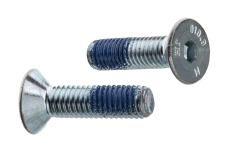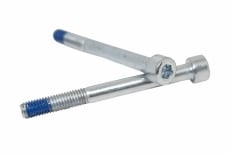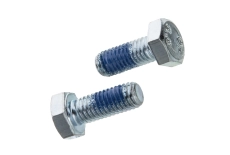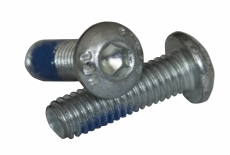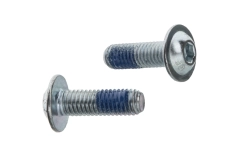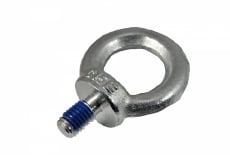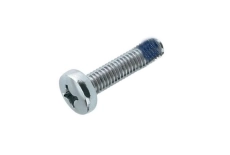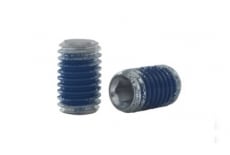Nylon-coated bolts are special-purpose fasteners that are heavily used in assemblies subject to vibration, shock, or cyclic loads. Due to the presence of a nylon layer on the threaded part, they provide reliable self-locking, reduce the risk of untwisting and allow to create a hermetic connection. The nylon coating on the bolts provides reliable protection against corrosion. This type of hardware has already become a standard in many industries, especially where the safety and reliability of structures are critically important.
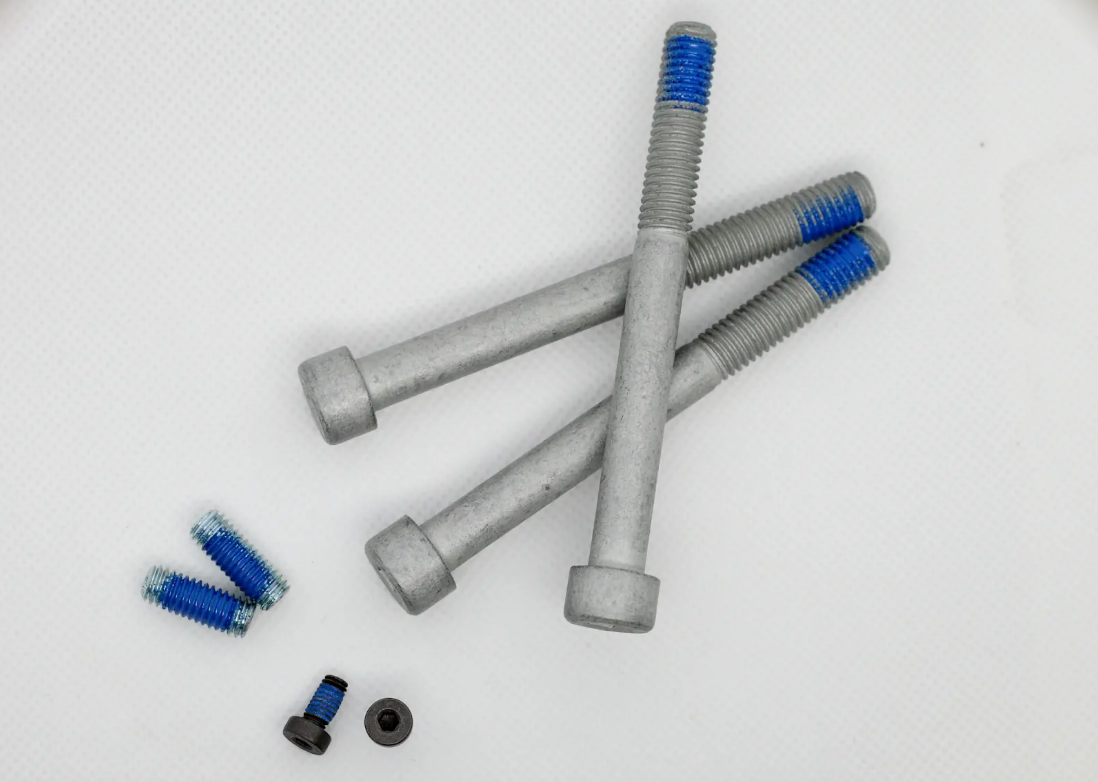 |
Compared to classic bolts, such products have an important advantage — they perform the function of sealing and fixing without the need for additional elements such as washers, grovers or thread retainers. That is why they reduce the number of component connections, speed up installation and minimize the human factor when assembling structures. Due to the properties of nylon, the coating can withstand significant temperature and mechanical loads. It is also important that such bolts can be mounted multiple times without losing their sealing properties. That is why they are used in responsible and dynamic nodes. To better understand why these bolts are such an effective solution for vibrating joints, it is worth looking at the phenomenon of loosening of threaded fasteners under the influence of vibrations. Read more in our article: Weakening of threaded fasteners, Junker test |
Fig.1 Types of bolts with nylon coating
The principle of operation of the nylon layer
The nylon layer applied to the bolt thread performs several tasks at once. First, it acts as a damper between the threads of the bolt and the nut, due to which it dampens oscillations and prevents spontaneous unwinding. Secondly, the material seals the joint, creating a seal and protecting it from the penetration of moisture, dust, oil and other environments. When the bolt is screwed into the corresponding element (nut or threaded hole), the nylon ring is partially deformed and tightly fits the thread turns. This pressure creates a zone of increased friction, which ensures stable retention even in vibration conditions. At the same time, the contact does not harm metal surfaces and does not require additional lubricant or sealants. Nylon-coated bolts have high anti-corrosion properties. It is also worth noting that the nylon insert allows repeated use - up to 5-10 cycles of tightening without loss of fixing properties. That is, the use of a nylon layer on fasteners increases their resistance to wear. This significantly reduces maintenance and repair costs, especially in industries with regular inspection of fasteners, such as aviation or mechanical engineering. The use of a nylon layer on fasteners increases their resistance to wear.
Types of nylon-coated bolt heads and slots
The variety of designs of this type of bolts allows you to choose the best option for any type of installation. The most common head options include: Hexagonal head — a universal option for open installation, Cylindrical (internal hexagon) — convenient for installation in hard-to-reach places, Flat, concealed — used in decorative or mortise connections, Round and conical — often used in mechanical engineering. Of types of slots, then the following are available: Cross-shaped (PH, PZ), Straight (SL), Internal hexagon (Allen), Torx (star-shaped).
These varieties allow the use of bolts both in standard assembly work and in automated or robotic systems. In addition, the ability to combine different heads with threaded diameters from M1 to M8 makes such bolts extremely versatile in use.
Pre-application: features of applying a nylon coating
Preapplication is the process of pre-applying a special sealing or fixing compound to the bolt thread before installation. This is how a nylon or microencapsulated coating is formed, which is supplied in a dry state, ready for use. The main types of coatings for this type of products are nylon itself and a microencapsulated layer.
- Nylon coating it is usually applied locally — in the form of a strip or spot on a part of the thread. The bolt is then heated to a temperature of about 71°C, which allows the nylon to soften and set tightly in the thread grooves.
- Microencapsulated coating are special adhesives that are activated during tightening. It is applied around the entire circumference of the thread, and during installation, the capsules burst, filling the space with sealing material. Application of pre-application is carried out by automated machines in production. Be sure to leave 2-3 turns of the thread without coating to facilitate the start of installation. Processing is carried out in a precise temperature regime to guarantee the reliability of fixation and preserve the properties of the coating. The coating can be applied:
- Local (point) — cost-effective and convenient,
- All the way around — for maximum sealing and sealing. This allows you to adapt the bolts to specific technical tasks, taking into account mechanical loads, climatic conditions and the specifics of structures.
Learn more about applying nylon coating in the video:
Basic technical characteristics and standards
Since nylon-coated bolts are technical products for a special purpose, their production and operational characteristics are regulated by relevant standards. This guarantees interchangeability, safe use and high quality of products regardless of the manufacturer.
The main international standards are DIN 267-27 and DIN 267-28. They clearly describe the requirements for such fasteners: d — thread diameter; a — a section with 2–3 turns without a coating to facilitate twisting; P - thread pitch; lb is the length of the area covered by the preapplication. Read more about:
Presentation with technical information about nylon-coated bolts:
Болти з нейлоновим покриття (upload the presentation to the website)
DIN 267-27 is generally used for bolts with full thread coverage, while DIN 267-28 is for spot localized applications. These standards contain specifications regarding: thickness and adhesion of the nylon layer; heat resistance and chemical resistance of the coating; bolt strength class (for example, 8.8, 10.9, etc.); number of tightening cycles without loss of properties. This allows you to accurately calculate tightening forces, choose the right tools for installation and guarantees the durability of the connection in difficult conditions.
Table of basic standards for nylon coated bolts
|
Standard |
Head shape / purpose |
|
Hex head, full thread |
|
|
Internal hexagon (cylindrical head) |
|
|
Countersunk head with hexagon |
|
|
Semi-circular head with internal hexagon |
|
|
Semicircular head with flange |
|
|
Hemispherical head with a cross-shaped slot |
Fig. 2 Table of basic standards of bolts with nylon coating
These standards guarantee the compatibility of bolts with the corresponding nuts and holes, allowing them to be quickly integrated into any production process or project. Also, standardization ensures uniform load distribution during installation and reduces the risks of mechanical damage to elements.
Fields of application of bolts with a nylon layer
Nylon coated bolts are very popular due to their reliability and versatility. Their ability to maintain fixation even under the influence of vibrations, temperature changes and loads makes them an ideal solution for a wide range of industries. The main industries where these types of bolts are used are the following. Engineering: Bolts are used in the connections of engines, gearboxes, chassis mounting systems and other vibrating components. Reliability and reusability of fasteners allow you to avoid regular replacement of hardware during maintenance. Aviation and aerospace industry: This is where these types of bolts play a critical role. Reliable fixation of connections without arbitrary unwinding is important for flight safety. Such bolts are often used in skins, panels, control units. Construction: In fastening ventilation systems, suspended ceilings, metal structures - where it is important to avoid loosening and shifting - nylon bolts provide additional strength and durability of installation. Also quite often these types of bolts are used in quite atypical areas: Modeling and robotics: Accuracy, lightness and reliability of connections are important here. Bolts of this type are also used in 3D printers, drones, and mechatronics. Agriculture: In outdoor machinery exposed to dust and moisture, the nylon layer acts not only as a retainer but also as a barrier against corrosion. Medical equipment: In medical equipment that requires sterility and precision, nylon-coated bolts avoid loosening during frequent sterilization, vibration and impact. Thus, nylon-coated bolts are a universal solution that works successfully in a wide variety of industries. Their ability to provide a stable connection even in difficult conditions makes them indispensable for modern production and technology.


 Bolts (6)
Bolts (6) Screws (2)
Screws (2)